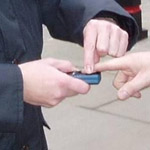 The Metropolitan Police has introduced new mobile fingerprint scanners across the force. The device, known as mobile identification or MobileID, can check a person's identity in two minutes.
The Metropolitan Police has introduced new mobile fingerprint scanners across the force. The device, known as mobile identification or MobileID, can check a person's identity in two minutes.
MobileID is about the size of a mobile phone and allows police to read the fingerprint of an index finger (pictured). According to a press statement from the Met, it checks the fingerprints with the national database but does not retain them afterwards. The device will be used in instances where an individual is suspected of committing an offence, or wanted for a previous offence.
Assistant Commissioner Mark Rowley said: "Mobile Identification is a technological step forward that helps police officers identify people quickly.
"Evidence has shown that a full identification arrest can tie-up both the subject and the police officer for several hours. Even a traditional identity check conducted on the street can take an extended period of time to complete.
"MobileID is effective particularly in revealing serious and violent offenders who will do everything they can to prevent the police from knowing their true identities.
"This technology means there is increased officer time spent on patrol, and as a result, helps to make communities safer."
The Met is one of 28 forces which took part in national trials led by the National Policing Improvement Agency (NPIA) using a similar mobile fingerprint device. The field trials reported significant benefits, including faster identification of perpetrators of crime, increased time on the frontline for police officers and improved levels of public confidence.
During trial the Met used the devices during the policing of the Royal Wedding and at the Notting Hill Carnival.
The device can also be used to identify people unconscious at scenes of incidents, or the deceased.
The move follows reports that the Met will be acquiring new software to allow it to interrogate mobile phones, including those that have the SIM blocked – a process hitherto requiring referral to forensic labs or specialist expert witness companies, such as those found in expert witness directories.
The developments all form part of Commissioner Hogan-Howe's commitment to make better use of technology to fight crime.